
Blue diode laser----another new leading technology of Laserline
source:laserfair.com
release:johnny
keywords: blue diode laser, laser manufacture news
Time:2018-10-12
The most used lasers are infrared, green and UV systems at the moment. A new type, blue laser started to attract some attention in 2017. Today, we want to introduce a leading technology from Laserline GmbH, a blue diode laser. What is a blue diode laser? How about the application potential? In the following text, Markus Ruetering, Asia sales manager of Laserline, will give us answers.
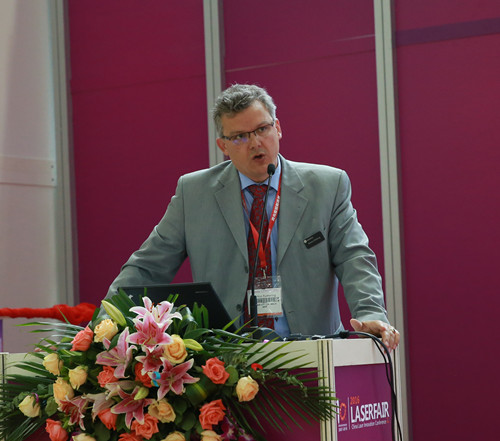
Markus Ruetering, Asia sales manager of Laserline
Laser Manufacture News: Laserline is a professional leading diode lasers supplier, so what products should we focus on in this year?
Markus: As a leading company in diode lasers, we keep developing our updated developments, so we are now manufacturing our diode lasers of its sixth generation already. We’ve already introduced our sixth generation of diode lasers to the world, which are suitable for several applications, with laser power levels in the range from 1 kW up to 25 kW. We also develop our own processing optics, where we can coverapplications like brazing, hardening, heat treatment, cladding, and plastic welding as well as newer applications like additive manufacturing or tape laying of CFRP’s. Our highlight of this year is a diode laser having a blue radiation of 450 nm. And we give it a high expectation.
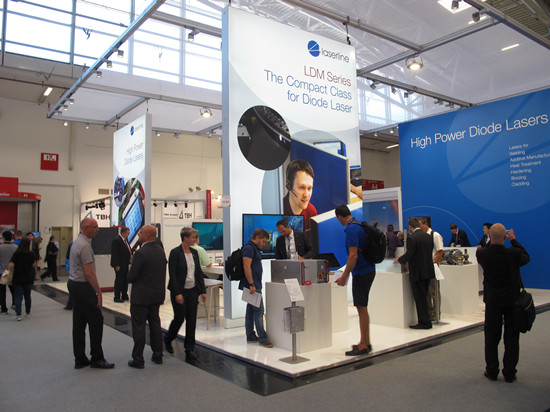
Laser Manufacture News: What are the advantages of the blue lasers?
Markus: The blue lasers with a wavelength of 450 nm have a very high absorption into materials which have a high reflection for classical wavelengths emitted by industrial lasers, so called non-ferrous metals. Specifically for copper, gold as well as silver materials.It has slightly better absorption into aluminum, but our focus with blue lasers is mainly on copper materials, as well as gold and silver. So when we look into the application that is considered from companies in terms of batteries, electronics, and the so called e-mobility – electro mobility. We need to do a lot of copper application in terms of welding, and it’s found and reported in a lot of investigations that lasers in the infrared section, infrared wavelength, cannot weld copper materials with the reason of process window or sometimes not at all. Welding copper with a 1 µm laser in addition to creating a lot of spatter, so if you have done an application, for example, in the battery industry, you have to clean the part after the welding. If you do this welds with a blue laser, the absorption is so high that you need much less power. We can do a lot of applications already with 500W using blue lasers while we need several kilowatt for infrared laser. We have a heat conduction welding rather than a keyhole welding, and the heat conduction welding helps us to have spatter-free welding of the samples, and with this, have next to the lower power, higher efficiency, and also the advantage of having a clean production.
Laser Manufacture News: In 2017, laser with new wavelengths attracted the attention in the market, and Laserline’s counterpart is blue diode laser, so what’s the difference between them?
Markus: The general advantage of diode lasers compared to either fiber lasers or disc lasers is that we have a direct conversion from electricity to light, so we don’t have the additional converting crystals or fibers like disc and fibers, and the system in the overall efficiency of the system is higher. When we look at the application of, like say, copper, people are actually using, as well, green lasers into this field, but to create a green laser, you have to first create an infrared light, and then you have to transfer infrared into green, and this is a high loss of efficiency. It increases the cost a lot, and investigations of the application have shown that a green laser is not capable of the same applications like blue, so the blue lasers that we are offering has no converter, or any frequency doubling crystal, etc, inside the system. We are making blue light straight from the diode, which is the highest efficiency possible in such a setup, and the blue light is having such high absorption as I mentioned before that in overall process when welding copper can easily gain an advantage of a factor of 20 and higher compared to existing technologies.
Laser Manufacture News: Could you please introduce the project achievement of your blue laser? Is Laserline in a leading position in terms of blue lasers now?
Markus: Laserline is two years through a three-year German government-funded project developing high-power blue diode lasers. The goal is to build a kilowatt blue diode laser. This was developed within the EFFILAS support measure of the Federal Ministry for Education and Research (BMBF) in close collaboration with OSRAM and other project partners, which has allowed for more effective welding processes of nonferrous metals, especially copper.Yes we have the highest power today, but we could not have done it on our own, as I mentioned it’s a funded project from the German government. The power we actually have in our laboratory is 700W, and that is, as far as we know, a world record in terms of available power in blue. We have done a lot of trails in our application lab already using 100/500/600W today with very good results. We have not released the laser as a product, because we first want to run through the project with our partners. Afterwards, I’m pretty sure that the blue diode laser will be the better technology compared to any frequency doubling or tripling that we have seen from other systems. There is another solution which is considered for blue diode laser, and I don’t think blue fiber laser or any other system has real chance to break into this market.
- RoboSense is to Produce the First Chinese Multi-beam LiDAR
- China is to Accelerate the Development of Laser Hardening Application
- Han’s Laser Buys Canadian Fiber Specialist CorActive
- SPI Lasers continues it expansion in China, appointing a dedicated Sales Director
- Laser Coating Removal Robot for Aircraft
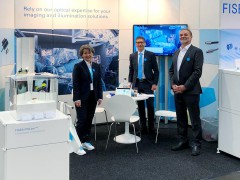 FISBA exhibits Customized Solutions for Minimally Invasive Medical Endoscopic Devices at COMPAMED in
FISBA exhibits Customized Solutions for Minimally Invasive Medical Endoscopic Devices at COMPAMED in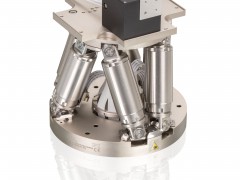 New Active Alignment System for the Coupling of Photonic Structures to Fiber Arrays
New Active Alignment System for the Coupling of Photonic Structures to Fiber Arrays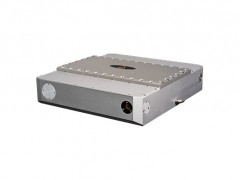 A new industrial compression module by Amplitude
A new industrial compression module by Amplitude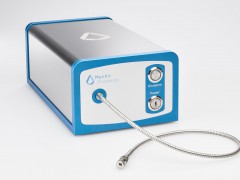 Menhir Photonics Introduces the MENHIR-1550 The Industry's First Turnkey Femtosecond Laser of
Menhir Photonics Introduces the MENHIR-1550 The Industry's First Turnkey Femtosecond Laser of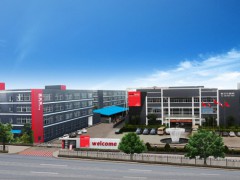 Shenzhen DNE Laser introduced new generation D-FAST cutting machine (12000 W)
more>>
Shenzhen DNE Laser introduced new generation D-FAST cutting machine (12000 W)
more>>
